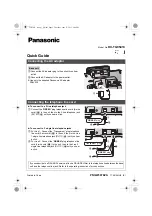
Utility stitches
51
V
A
R
IOU
S ST
IT
C
H
ES
3
f
After removing the fabric, use the eyelet punch to cut a
hole in the center of the eyelet.
• When using the eyelet punch, place thick paper or
some other protective sheet under the fabric before
punching the hole in the fabric.
■
Fagoting
Stitching across an open seam is called “fagoting”. It is used
on blouses and children's clothing. This stitch is more
decorative when thicker thread is used.
a
Use an iron to fold the two pieces of fabric along their
seams.
b
Baste the two pieces of fabric, separated by about 4
mm (3/16 inch), onto thin paper or a sheet of water-
soluble stabilizer.
If you draw a line down the middle of the thin paper or
water-soluble stabilizer, sewing is easier.
c
Attach zigzag foot “J”.
d
Select a stitch.
• For details, refer to “Stitch Chart” on page 35.
e
Set the stitch width to 7.0 mm (1/4 inch).
f
Sew with the center of the presser foot aligned along
the center of the two pieces of fabric.
g
After sewing is finished, remove the paper.
■
Scallop stitching
The wave-shaped repeated stitch pattern that looks like shells
is called “scalloping”. It is used on the collars of blouses and
to decorate the edges of projects.
a
Attach monogramming foot “N”.
b
Select a stitch.
• For details, refer to “Stitch Chart” on page 35.
c
Stitch along the edge of the fabric, making sure not to
sew directly on the edge of the fabric.
d
Trim along the stitches.
• Be careful not to cut the stitches.
■
Smocking
The decorative stitch created by stitching or embroidering
over gathers is called “smocking”. It is used to decorate the
front of blouses or cuffs.
The smocking stitch adds texture and elasticity to fabric.
a
Attach zigzag foot “J”.
b
Select the straight stitch, and then adjust the stitch
length to 4.0 mm (3/16 inch) and loosen the thread
tension.
c
Sew parallel stitching at intervals of 1 cm (3/8 inch)
and pull the bobbin threads to create gathers.
Smooth the gathers by ironing them.
d
Select a stitch.
• For details, refer to “Stitch Chart” on page 35.
1
Thin paper or water-
soluble stabilizer
2
Basting stitching
3
4 mm (3/16 inch)
No.
2-11
2-12
Stitch
2
1
3
No.
2-06
Stitch
No.
2-10
2-11
2-12
Stitch
Summary of Contents for 888-M20
Page 2: ...Cover2 3 PANTONE 285 C K ...
Page 36: ...Useful Sewing Tips 34 ...
Page 58: ...Using The Memory Function 56 ...
Page 78: ...Using the Memory Function 76 ...
Page 94: ......
Page 95: ......
Page 96: ......
Page 97: ......
Page 98: ......
Page 99: ...Cover2 3 PANTONE 285 C K ...
















































